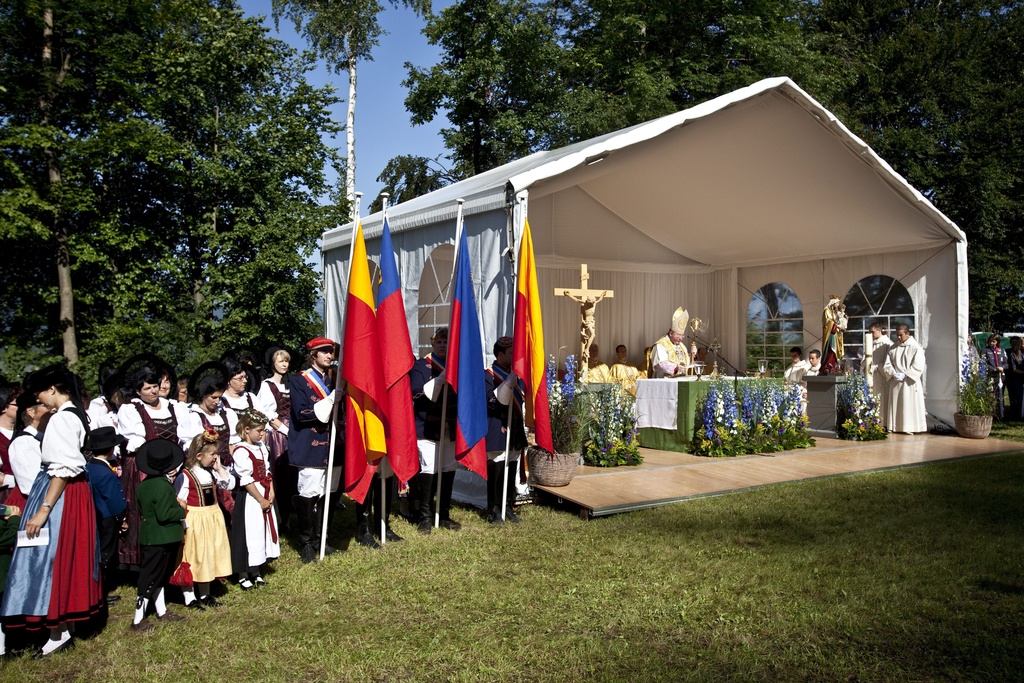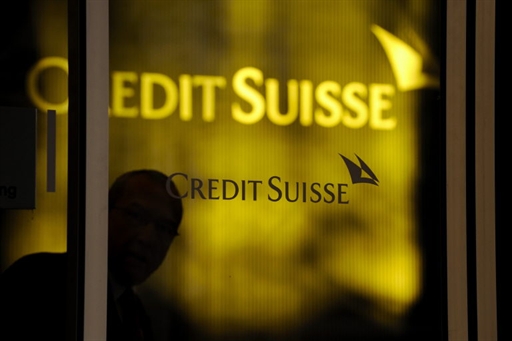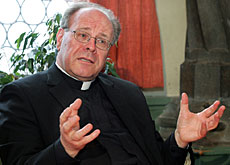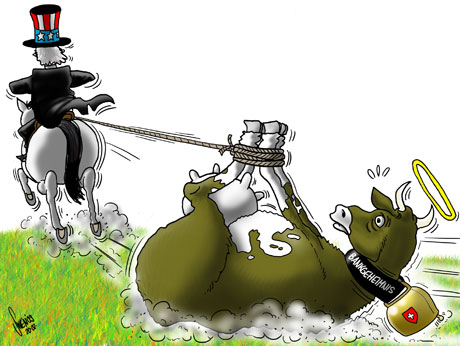Troubled tax haven keeps flag flying

Like its neighbour Switzerland, Liechtenstein has been plagued by financial scandals which are overshadowing the principality’s national day celebrations this year.
Small Switzerland is a giant compared to lilliputian Liechtenstein, which uses the Swiss franc as its currency and has a customs union with Switzerland, which represents it at embassies all over the world.
On August 15, the people of Liechtenstein celebrate their national holiday with a high mass led by the archbishop followed by a public reception hosted by the royal family in the castle gardens. It’s followed by a street party in the town of Vaduz below and a display of fireworks at night.
Festive or not, Liechtenstein has had its fair share of troubles in recent years. There have been internal divisions as well as international scandals involving tax evasion and money laundering.
To begin with, there have been tensions between the reigning prince, Hans-Adam II, and political forces in the country over the past 20 years of his reign. He has also weathered two major constitutional crises.
Hans-Adam, now 65, no longer runs day-to-day functions. He passed the head-of-state role to his son and heir Prince Alois, who was born in Zurich in 1968. However, the older prince’s presence is still felt and he heads the LGT Bank, owned by the house of Liechtenstein. The blunt, outspoken prince continues to raise hackles.
Political pundits have said that Hans-Adam’s power is unusually large for a democracy in the 21st century. His family and the princely corporations do not have to pay taxes, and he fills key positions in administration and justice.
Tax haven
Liechtenstein’s greatest troubles, however, have come from tensions with the outside world, especially Germany, because of the principality’s tax haven status. The corporate tax rate here is no more than 20 per cent and businesses wishing to avoid tax in Germany were able to establish themselves with little more than a mailbox in Vaduz.
Wealthy German individuals hoping to evade tax on their fortunes also funnelled money into the principality.
A lot of these dubious financial practices came to light after Heinrich Kieber, a Liechtenstein whistleblower, sold information on tax-dodging Germans to the German authorities two years ago.
Both Liechtenstein and Switzerland were on the OECD “grey list” of states not complying with international tax rules. Like Switzerland, the principality was taken off the list in the past year after signing double taxation accords with other countries.
“We have succeeded in getting out of the firing-line of international criticism,” said Prince Alois in a recent interview with the local press. Yet he added, “We haven’t got to the end of it, of course. Internationally there is still a lot of scepticism as to whether we are serious about all this.”
It is currently alleged that illegal money such as bribes were being laundered through Liechtenstein by firms such as the Swiss-Swedish multinational, ABB. There has also been a recent stir over revelations that the late Austrian rightwing populist politician Jörg Haider may have been using Liechtenstein to stash away millions beyond the reach of the tax man at home.
Religious tension
There have also been tensions between the Church and people in this very Catholic country because of Archbishop Wolfgang Haas. A native son, he was the Bishop of the Swiss diocese of Chur (which included Liechtenstein) until he was forced out of office in 1997. This led to the Vatican creating a new see for him by making him the first Archbishop of Vaduz. To the dismay of many inside and outside Liechtenstein, his archdiocese has become a mecca for ultra-conservative Catholic clergy and laity from around the German-speaking world.
Theologian Christoph Klein, who has worked in Liechtenstein and led the opposition to Haas, has complained that “committed and deeply religious members of the church are no longer allowed to contribute their thoughts and their creative ability, since all committees in which lay people were active have been liquidated or neutralised”.
On the positive side in a country that has had little to celebrate recently, Liechtenstein has now been a member of the United Nations for 20 years. At the beginning of September this anniversary will be marked by an official visit from UN Secretary-General Ban Ki-moon.
Meanwhile, the people of Liechtenstein remain attached to their prince and their unique national traditions. And so on this festive day, despite the rumblings on the horizon, all goes smilingly in the royal castle and in the town of Vaduz below.
Terence MacNamee, swissinfo.ch
The scandals about Liechtenstein as a tax haven reached a climax in 2008 when a man who had worked for the principality’s LGT Bank, Heinrich Kieber, sold data on secret accounts to the German authorities.
This resulted in the spectacular resignation of the CEO of Deutsche Post, Klaus Zumwinkel, whose name cropped up among the data.
Kieber, known as “the data thief”, is continuing his allegations and journalists are wondering how much explosive information he still has in reserve.
Just in time for Liechtenstein’s national day he has published an e-book called “The Prince. The Thief. The Data”.
Liechtenstein is one the smallest sovereign states in Europe with an area of 160 sq km and a population of about 36,000. It is situated between Switzerland and Austria.
It uses the Swiss franc, there is no border with the neighbouring Swiss cantons, and the people speak a language similar to Swiss-German.
Liechtenstein is a constitutional monarchy ruled by a Prince Hans-Adam II, styled “von und zu Liechtenstein”, which means that he is both of the royal house and resident in the principality. Earlier princes were non-residents; the present prince still has palaces in Vienna housing a magnificent art collection that is now open to the public.
The principality has an elected parliament of 25 members, from which a government of five is chosen. Liechtenstein has achieved notoriety in recent years as a tax haven, but in fact it has a diverse economy and is highly industrialised.
Liechtenstein was originally a fief of the Holy Roman Empire, ruled since the beginning of the 18th century by the Austrian princely house of Liechtenstein.
Through a series of chances it managed to become and remain an independent state, closely associated at first with Austria and then, after the First World War, with Switzerland. It has been a constitutional monarchy on democratic principles since 1921.

In compliance with the JTI standards
More: SWI swissinfo.ch certified by the Journalism Trust Initiative



You can find an overview of ongoing debates with our journalists here . Please join us!
If you want to start a conversation about a topic raised in this article or want to report factual errors, email us at english@swissinfo.ch.